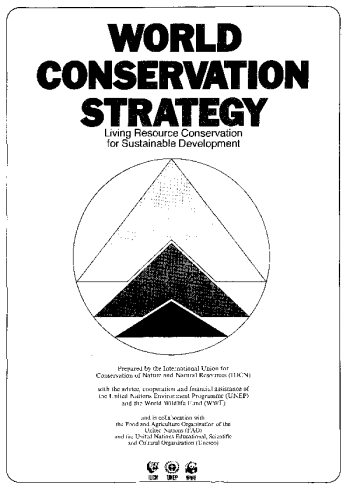
World Conservation Strategy: Living Resource Conservation for Sustainable Development
The aim of the World Conservation Strategy is to achieve the three main objectives of living resource conservation:
a. to maintain essential ecological processes and life-support systems (such as soil regeneration and protection, the recycling of nutrients, and the cleansing of waters), on which human survival and development depend;
b. to preserve genetic diversity (the range of genetic material found in the world's organisms), on which depend the functioning of many of the above processes and life-support systems, the breeding programmes necessary for the protection and improvement of cultivated plants, domesticated animals and microorganisms, as well as much scientific and medical advance, technical innovation, and the security of the many industries that use living resources;
c. to ensure the sustainable utilization of species and ecosystems (notably fish and other wildlife, forests and grazing lands), which support millions of rural communities as well as major industries.
International Union for Conservation of Nature and Natural Resources (IUCN) (1980). World Conservation Strategy: Living Resource Conservation for Sustainable Development. Gland, Switzerland.
-
IUCN
We support the free flow of information. Please share:
Form coming soon
Related Content
-

Review of African Social and Economic Development Volume 1
ByIbrahim Bàbátúndé Anobaarrow_forward2024 -

Economic Analysis: Climate Change and Wildlife Utilization on Private Land
ByJackson OtienoEdwin Muchapondwaarrow_forward2015 -

Get updates by email
Through impactful research, stakeholder engagement, and professional development, AWEI is supporting the wildlife economy across Africa. Please subscribe for occasional updates on our work and forthcoming events.
Sign up for a quarterly dose of AWEI insights
In a complex and changing world, AWEI generates strategic ideas, conducts independent analysis on wildlife economies, and collaborates with global scholar-practitioners to provide training and expertise for biodiversity conservation, climate resilience, and inclusive economic opportunities in Africa.
